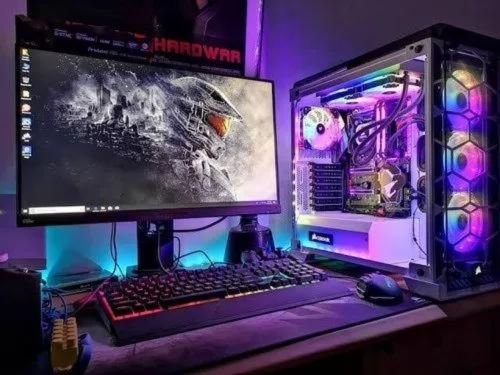Introduction
In the world of gaming, having the right setup can mean the difference between a mediocre experience and one that’s truly immersive. A gaming PC is specifically designed to handle the demands of modern games, providing the power and efficiency needed for high-quality graphics, smooth gameplay, and multitasking capabilities. As the gaming landscape continues to evolve, so does the technology behind gaming PCs, making it essential for gamers to stay informed about the latest trends and hardware options.
Components of a Gaming PC
CPU (Central Processing Unit)
At the heart of any gaming PC is its CPU, often referred to as the “brain” of the computer. A powerful CPU can significantly enhance gaming performance, especially in CPU-intensive titles. When selecting a CPU, consider options from reputable brands like Intel and AMD. Popular models, such as the Intel Core i7 or the AMD Ryzen 7, strike a great balance between performance and price, allowing gamers to experience smooth gameplay without breaking the bank.
GPU (Graphics Processing Unit)
The GPU is arguably the most critical component in a gaming PC, responsible for rendering the visuals of your games. A high-performance graphics card can deliver stunning graphics and higher frame rates, making gameplay more enjoyable. Brands like NVIDIA and AMD dominate the GPU market, with models such as the NVIDIA GeForce RTX 3080 and AMD Radeon RX 6800 XT being top choices for serious gamers. These GPUs support advanced features like ray tracing, which enhances the realism of lighting and shadows in games.
Motherboard
Choosing the right motherboard is crucial as it dictates compatibility with other components. Look for a motherboard that supports the latest technologies, including PCIe 4.0 and USB 3.2. Brands like ASUS, MSI, and Gigabyte offer reliable options tailored for gaming, featuring robust power delivery and excellent build quality.
RAM (Random Access Memory)
RAM is vital for multitasking and smooth gameplay. A minimum of 16GB is recommended for modern gaming, with 32GB being ideal for those who like to stream or run multiple applications simultaneously. Opt for high-speed RAM (3000MHz or above) to maximize performance.
Storage
When it comes to storage, gamers face a choice between SSDs and HDDs. SSDs provide faster load times and better overall performance, while HDDs offer more storage at a lower price. A combination of both—a smaller SSD for your operating system and a larger HDD for games—often works best for gamers looking to balance speed and capacity.
Power Supply Unit (PSU)
A reliable PSU is essential to ensure that all components receive adequate power. A good rule of thumb is to choose a PSU with at least 80 PLUS Bronze certification for efficiency. The wattage required will depend on your specific components, but a range of 650-850 watts is generally sufficient for most gaming setups.
Cooling Systems
High-performance components generate heat, making an effective cooling system essential for maintaining optimal performance. Gamers can choose between air cooling and liquid cooling solutions. Air coolers are more straightforward to install and maintain, while liquid cooling can offer superior thermal performance and aesthetics.
Building vs. Buying a Gaming PC
When it comes to acquiring a gaming PC, gamers face a choice: build their own or buy a pre-built model. Building your own PC allows for greater customization and often yields better value for money. However, it requires time, research, and a bit of technical know-how. On the other hand, pre-built gaming PCs offer convenience and often come with customer support, making them ideal for those who may not want to delve into the intricacies of PC building.
Gaming Monitors and Accessories
A great gaming PC deserves an equally impressive monitor. Look for monitors with high refresh rates (144Hz or more) and low response times to enhance your gaming experience. Brands like ASUS, Acer, and Dell offer excellent gaming monitors that cater to various budgets.
In addition to monitors, essential gaming peripherals such as mechanical keyboards, high-DPI mice, and comfortable headsets can elevate your gaming setup. Ergonomic gaming chairs also play a crucial role in ensuring comfort during long gaming sessions, preventing fatigue and promoting better posture.
Software and Optimization
When it comes to software, most gamers opt for Windows due to its compatibility with a vast array of games and applications. However, Linux is becoming increasingly popular within some gaming communities. To optimize your gaming experience, consider using software like NVIDIA GeForce Experience or AMD’s Radeon Software for driver updates and performance tweaks.
Future Trends in Gaming PCs
The future of gaming PCs looks bright, with emerging technologies set to redefine the gaming experience. Features like ray tracing and AI-driven graphics are becoming more mainstream, promising to deliver stunning visuals and smarter gameplay mechanics. As VR and AR technologies evolve, gaming PCs will need to keep pace, ensuring that gamers have access to the latest innovations.
Conclusion
Investing in a gaming PC is more than just a purchase; it’s an investment in a world of possibilities. From choosing the right components to considering future trends, understanding the intricacies of gaming PCs can greatly enhance your gaming experience. Whether you choose to build your own rig or opt for a pre-built model, a quality gaming PC will open doors to immersive gaming worlds and unforgettable experiences. So get ready to elevate your gaming experience and dive into the next level of immersive adventures!
